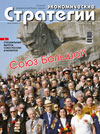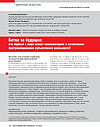Battle for the Future: Who Will Be the First in the World to Master the Noomonitoring and Cognitive Programming of Subjective Reality?
The key factor determining the victory in the battle for the future is not the territory, not the army and not the volume of financial, material and intellectual resources being involved. The key factor of the victory is cognitive programming of subjective reality: mass-individual adjustment of the semantic interpretation of the existence goal and life success to form the material future through self-adjustment of the surrounding subjective reality to the “image of Victory” in cognitive perception of oneself and the surrounding material, virtual and imaginary individual world. Special urgency is acquired by this factor in conditions of building a “digital economy”. The basis of such mechanisms constitutes noomonitoring as a tool for making a “cognitive snapshot” of subjective reality, forecasting, planning and metaprogramming on its basis the “image of Victory” by forming in groups of individuals new knowledge about themselves and the surrounding world, as well as the structure of ideological and professional patterns for interpreting surrounding reality and its subsequent correction within the personal management while developing and implementing management decisions of individuals and groups as a basic reference point for managing groups of interrelated people, machines, technical, including information, systems and natural objects.
References:
1. Ageev A.I. Kognitivnyy dissonans [Cognitive Dissonance]. Ekonomicheskie strategii, 2013, no. 4 (112), pp. 5.
2. Lepskiy V.E. Refleksivno-aktivnye sredy innovatsionnogo razvitiya [Reflective-Active Environments of Innovation Development]. Moscow, Kogito-Tsentr, 2010, 280 p.
3. Raykov A.N. Kognitivnoe programmirovanie [Cognitive Programming]. Ekonomicheskie strategii, 2014, no. 4, pp. 108–113.
4. Bugaev A.S., Loginov E.L., Raykov A.N., Saraev V.N. Semantika setevykh kontaktov [Semantics of Network Contacts]. Nauchno-tekhnicheskaya informatsiya. Seriya 1. Organizatsiya i metodika informatsionnoy raboty, 2009, no. 2, pp. 33–36.
5. Raykov A.N. Transtsendental’naya vizual’naya analitika dlya podderzhki strategicheskogo i territorial’nogo planirovaniya [Transcendental Visual Analytics to Support Strategic and Territorial Planning]. Trudy Mezhdunarodnoy nauchnoy konferentsii “Situatsionnye tsentry i IAS4i dlya monitoringa I bezopasnosti”, 2015–2016, 21–24, November [Situational Centers and IAS4i for Monitoring and Security]. Moscow, Protvino: Izdatel’stvo Instituta fiziko-tekhnicheskoy informatiki (IFTI), pp. 1–7.
6. Vayno A.E., Kobyakov A.A., Saraev V.N. Obraz Pobedy [Image of Victory]. Moscow, INES, kompaniya GLOWERS, 2012, 140 p.
7. Dlya nooskopa net detaley [There are no Details for Nooscope], available at: https://www.gazeta.ru/social/2016/08/16/10133561.shtml.
8. Mezhdistsiplinarnye issledovaniya v oblasti nano-, bio-, info- i kognitivnykh nauk s ispol’zovaniem rentgenovskogo, sinkhrotronnogo i neytronnogo izlucheniy [Interdisciplinary Research in the Field of Nano-, Bio-, Info- and Cognitive Sciences with the Use of X-ray, Synchrotron and Neutron Radiation]. Natsional’nyy issledovatel’skiy tsentr “Kurchatovskiy institut”, available at: http://nrcki.ru/pages/main/5354/5916/5367/index.shtml.
9. Shevrin H., Williams W.J, Marshall R.E. System for assessing verbal psychobiological correlates. US Patent no. 4699153. 1987.
10. Lefevr V.A. Refleksiya [Reflection]. Moscow, Kogito-Tsentr, 2003, 495 p.
11. Ul’yanov S., Reshetnikov A., Nikolaeva A. Intellektual’nye sistemy upravleniya v nepredvidennykh situatsiyakh. Optimizator baz znaniy na myagkikh vychisleniyakh [Intelligent Control Systems in Unforeseen Situations. Knowledge Base Optimizer for Soft Computing]. Saarbruken, LAP LAMBERT, 2013, 372 p.
12. Ageev A.I., Eliseeva E.R., Kostylev E.V. Razryv shablonov [Breaking Patterns]. Ekonomicheskie strategii, 2015, no. 7 (132), pp. 104–115.
13. Lyuttvak E.N. Gosudarstvennyy perevorot: Prakticheskoe posobie [The Coup D’etat: A Practical Guide]. Moscow, Russkiy fond sodeystviya obrazovaniyu i nauke, 2015, 326 p.
14. Stolyarenko A.M., Eriashvili N.D. Primenenie psikhotekhniki nablyudeniya dlya vyyavleniya potentsial’no opasnykh lits [Applying Psychotechnology of Surveillance to Identify Potentially Dangerous Persons]. Obrazovanie. Nauka. Nauchnye kadry, 2014, no. 6, pp. 215–219.
15. Zelenin D.V., Loginov E.L. Integratsiya intellektual’nykh upravlencheskikh sred (prostranstv) kak osnova modernizatsii I tekhnologicheskogo razvitiya ekonomiki Rossii [Integration of Intellectual Management Environments (Spaces) as a Basis for Modernization and Technological Development of the Russian Economy]. Ekonomicheskie nauki, 2010, no. 9, pp. 22–25.
16. Programma’2015 [Program-2015]. DARPA, available at: https://mipt.ru/education/chairs/theor_cybernetics/government/upload/3af/Program_darpa2015_rus.pdf.
17. Lilli D., Dass R. Programmirovanie i metaprogrammirovanie chelovecheskogo biokomp’yutera. Eto tol’ko tanets [Programming and Metaprogramming of a Human Biocomputer. It’s Just a Dance]. Kiev, Sofiya, 1994, 320 p.
18. Loginov E.L., Eriashvili N.D., Bortalevich S.I., Loginova V.E. Sistematika atributivno-semanticheskikh svyazey pri osushchestvlenii obrazovatel’nykh programm interaktivnogo obucheniya dlya metaprogrammirovaniya kachestv lichnosti [Systematics of Attributive-Semantic Links in Implementing Educational Programs of Interactive Learning for Metaprogramming of Personality Traits]. Mezhdunarodnyy zhurnal psikhologii i pedagogiki v sluzhebnoy deyatel’nosti, 2016, no. 2, pp. 46–52.
19. Lefevr V.A. Refleksiya [Reflection]. Moscow, Kogito-Tsentr, 2003, 495 p.
20. Novikov D.A., Chkhartishvili A.G. Refleksivnye igry [Reflexive Games].Moscow, SINTEG, 2003, 160 p.
21. Smirnov I., Beznosyuk E., Zhuravlev A. Psikhotekhnologii: Komp’yuternyy psikhosemanticheskiy analiz i psikhokorrektsiya na neosoznavaemom urovne [Psychotechnologies: Computer Psychosemantic Analysis and Psychocorrection at an Unconscious Level]. Moscow, Izdatel’skaya gruppa “Progress” — “Kul’tura”, 1995, 416 p.
22. Lepskiy V.E. Evolyutsiya predstavleniy ob upravlenii (metodologicheskiy i filosofskiy analiz) [Evolution of Ideas on Management (Methodological and Philosophical Analysis)]. Moscow, Kogito-Tsentr, 2015, 107 p.
23. Raikov A.N., Avdeeva Z., Ermakov A. Big Data Refining on the Base of Cognitive Modeling. Proceedings of the 1st IFAC Conference on Cyber-Physical & Human-Systems, Florianopolis, Brazil. 7–9 December, 2016, pp. 147–152.
24. Loginov E.L., Raykov A.N., Eriashvili N.D. Kognitivno-setevye modeli podgotovki otdel’nykh lichnostey i ikh agregirovannykh grupp k resheniyu slozhnykh professional’nykh zadach v krizisnykh usloviyakh bystro izmenyayushcheysya vneshney sredy [Cognitive-Network Models for Training Individuals and Their Aggregated Groups to Solving Complex Professional Tasks in the Crisis Conditions of Rapidly Changing External Environment]. Gosudarstvennaya sluzhba i kadry. 2015, no. 1, pp. 89–95.
25. Ageev A.I., Loginov E.L. “Upravlenie smyslami” kak osnova kombinirovaniya veroyatnostey ekonomicheskoy real’nosti [“Management of Meaning” as the Basis for Combining Economic Reality Probabilities]. Ekonomicheskie strategii, 2014, no. 1 (117), pp. 16–25.
26. Loginov E.L., Eriashvili N.D., Bortalevich S.I., Loginova V.E. Tekhnologiya konstruirovaniya kachestv lichnosti na osnove imprintiruemykh refleksivnykh matrits [Technology of Personality Traits Constructing Based on Imprinted Reflective Matrices]. Vestnik Moskovskogo universiteta MVD Rossii, 2016, no. 7, pp. 252–256.
27. Raykov A.N. Semantika i metafizika motivatsiy i tseley v upravlenii [Semantics and Metaphysics of Motivations and Goals in Management]. Nauchnotekhnicheskaya informatsiya. Seriya 1. Organizatsiya i metodika informatsionnoy raboty, 2008, no. 12, pp. 12–19



